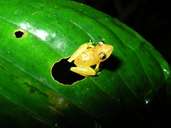Pristimantis caryophyllaceus
Pristimantis caryophyllaceus is a species of frog in the family Craugastoridae. It is found in Costa Rica and Panama; records from Colombia prior to 2010 refer to Pristimantis educatoris.[2] However, taxonomy of Pristimantis caryophyllaceus and P. educatoris remain unsettled, and many sources continue to report Pristimantis caryophyllaceus from Colombia.[1][3][4][5]
| Pristimantis caryophyllaceus | |
|---|---|
 | |
| Scientific classification | |
| Kingdom: | Animalia |
| Phylum: | Chordata |
| Class: | Amphibia |
| Order: | Anura |
| Family: | Craugastoridae |
| Genus: | Pristimantis |
| Species: | P. caryophyllaceus |
| Binomial name | |
| Pristimantis caryophyllaceus (Barbour, 1928) | |
| Synonyms | |
|
Eleutherodactylus caryophyllaceus (Barbour, 1928) | |
Pristimantis caryophyllaceus is sometimes known as the La Loma robber frog,[1][2][4] after La Loma, its type locality on the trail between Chiriquicito and Boquete, in the Bocas del Toro Province of Panama.[2]
Description
Males grow to 24 mm (0.94 in) and females to 26 mm (1.0 in) in snout–vent length. Tympanum is not clearly visible. Dorsal colouration is highly variable: yellow, pinkish, brownish, greyish, or dark green. There are always distinct darker spots on the dorsal surface, in some individuals extending into dark crossbars. The ventral surface is white, sometimes with some dark pigmentation.[4]
Reproduction
Eggs are laid on leaves[1][4] or on the ground.[5] Females brood the eggs, covering them with their bodies.[1][4]
Habitat and conservation
The species' natural habitats are primary lowland moist and wet forest, premontane wet forests, and rainforests. They occur in the leaf-litter and low vegetation,[1] and also in bromeliads.[5] They are nocturnal.[5]
Pristimantis caryophyllaceus is threatened by habitat loss and possibly chytridiomycosis. It has disappeared from lowland areas of Costa Rica.[1]
References
- Pounds, J.; Bolaños, F.; Solís, F.; Ibáñez, R.; Chaves, G.; Savage, J.; Jaramillo, C.; Fuenmayor, Q.; Castro, F.; Grant, T.; et al. (2008). "Pristimantis caryophyllaceus". IUCN Red List of Threatened Species. 2008: e.T56497A11475825. doi:10.2305/IUCN.UK.2008.RLTS.T56497A11475825.en.
- Frost, Darrel R. (2015). "Pristimantis caryophyllaceus (Barbour, 1928)". Amphibian Species of the World: an Online Reference. Version 6.0. American Museum of Natural History. Retrieved 6 June 2015.
- Acosta-Galvis, A.R. (2015). "Pristimantis caryophyllaceus (Barbour, 1928)". Lista de los Anfibios de Colombia V.05.2015. www.batrachia.com. Retrieved 6 June 2015.
- "Pristimantis caryophyllaceus". Amphibians of Panama. Smithsonian Tropical Research Institute. Retrieved 6 June 2015.
- Luis Humberto Elizondo C.; Federico Bolaños V. (2011). "Pristimantis caryophyllaceus". Biodiversidad de Costa Rica. Instituto Nacional de Biodiversidad. Retrieved 6 June 2015.
